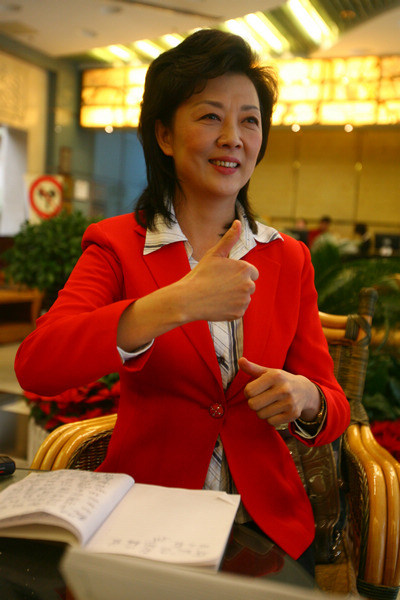A sign of progress
Updated: 2012-03-13 07:50
By Tong Hao (China Daily)
|
||||||||
Zhou Ye once had a choice to make: Be a model shining on a T-shaped stage or teach sign language to those with hearing disabilities.
Standing 173 centimeters and having passed a strict interview, she set her eyes on modeling.
Her father had other ideas.
Now almost three decades later, Zhou was able to strut her stuff on live television as the sign language interpreter when Premier Wen Jiabao delivered the government work report to the National People's Congress on March 5.
|
 |
|
Zhou Ye, a sign language interpreter, signs "success" during a live broadcast of the annual sessions. [Zhao Shi / for China Daily] |
"Wen's report lasted one hour and 53 minutes, during which I made more than 14,000 signs non-stop. That's the longest and also the heaviest task I've ever undertaken," Zhou said.
Zhou even invited one of her colleagues to be ready in case she couldn't last to the end.
"There was a moment when I felt an itch on my face. I tried hard not to scratch it by focusing my mind on the interpreting and gradually the itch disappeared."
By the time Zhou finished the interpretation of Wen's report, she could hardly move her shoulders.
But she was too excited to notice the soreness as her interpretation received immediately applause from the audience.
"The job has my full devotion," said the 49-year-old, who also interpreted the work reports of Jia Qinglin, chairman of the Chinese People's Political Consultative Conference, and Wu Bangguo, chairman of the NPC Standing Committee.
Wearing shoulder-length hair and dressed in bright red against a sky-blue background, Zhou, sitting upright, neatly made signs with her slender fingers.
Zhou said she chose bright red because "light colors close to the skin may prevent viewers from seeing my signs clearly".
This year was the first time the country had a sign language interpreter for the live broadcast of the annual NPC/CPPCC sessions, allowing the deaf and hearing-impaired to "hear" state leaders introduce what the central government has done and its future vision.
"I'm glad that the government has adopted this practice and allowed me the chance to help the deaf and hearing-impaired fulfill their political rights," said Zhou, who is also headmaster of Beijing Dongcheng District Special Education School, which now has about 195 students with hearing problems.
Easy as it seems, interpreting the two sessions during the live broadcast remained a challenge for Zhou, who has more than 29 years of sign language teaching experience under her belt.
"I felt so nervous when I first learned of the task," she recalled, despite the fact that she has been working as a sign language interpreter for a news program with China Central Television since October.
"Compared with the news program, the two sessions are very politically important, so any mistake is not allowed," Zhou explained.
To keep the information in the reports under wraps, Zhou could only get the printed documents about one or two hours in advance. The time was not long enough for her to fully practice the whole contents but only read them briefly.
To build confidence for the challenge, Zhou practiced on work reports from previous years.
"I tried to get familiar with their contents. If I came across a strange Chinese character, I would check the sign language dictionary, which covers most of the commonly used characters in daily life," she added.
Besides written materials, Zhou also watched videos of the three speechmakers.
"I can figure out their word speed in the video. Wen speaks the slowest among the three. Jia has an accent from a local dialect but that doesn't influence my listening," she said.
Cheng Kai, vice-chairman of the China Disabled Persons' Federation, sent Zhou a text message soon after the live broadcast saying: "Thank you for your hard work. For the first time, people with hearing disabilities in the country were able to 'hear' the government's work report live."
People left comments online calling Zhou "the most amiable face" during the NPC/CPPCC sessions and "the most exhausted person during the live broadcast of the two sessions."
Zhou advocated that sign language interpretation be offered for more TV programs to assist hearing-impaired people.
For her, nothing makes her happier than seeing her fellow students pick up a new skill or get access to a new service that allows them to lead lives closer to those of people who can hear.
Only she knew how hard she had worked to make it happen, which "seemed nothing when I saw how happy the children and their families had become with every step they made."
"I think our work helps the students rewrite their lives, which reflects the value of our work and lives," Zhou said.
"That's why when I look back, I have never regretted that I gave up my modeling dream."
Contact the writer at tonghao@chinadaily.com.cn

 Relief reaches isolated village
Relief reaches isolated village
 Rainfall poses new threats to quake-hit region
Rainfall poses new threats to quake-hit region
 Funerals begin for Boston bombing victims
Funerals begin for Boston bombing victims
 Quake takeaway from China's Air Force
Quake takeaway from China's Air Force
 Obama celebrates young inventors at science fair
Obama celebrates young inventors at science fair
 Earth Day marked around the world
Earth Day marked around the world
 Volunteer team helping students find sense of normalcy
Volunteer team helping students find sense of normalcy
 Ethnic groups quick to join rescue efforts
Ethnic groups quick to join rescue efforts
Most Viewed
Editor's Picks

|

|

|

|

|

|
Today's Top News
Health new priority for quake zone
Xi meets US top military officer
Japan's boats driven out of Diaoyu
China mulls online shopping legislation
Bird flu death toll rises to 22
Putin appoints new ambassador to China
Japanese ships blocked from Diaoyu Islands
Inspired by Guan, more Chinese pick up golf
US Weekly

|

|






